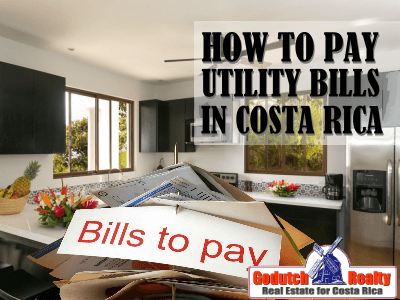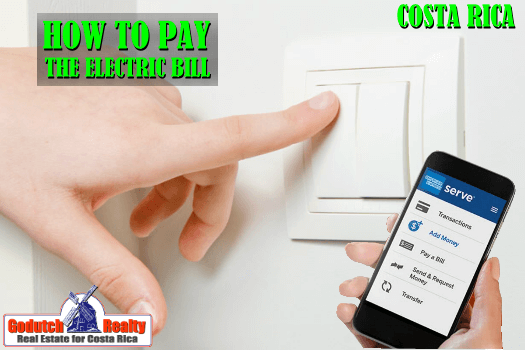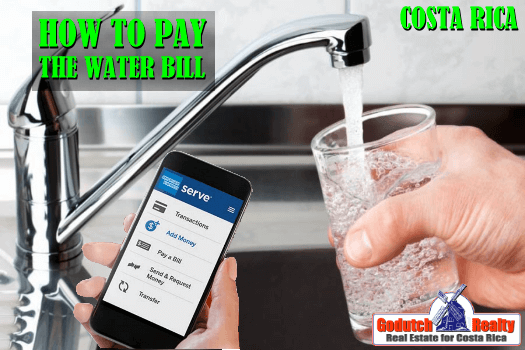Estimated Reading Time: 7 Minutes

I’ve found out how to pay my utility bills. But I’ll start this blog with a disclaimer.
My chosen topic for today’s blog, paying utility bills in Costa Rica, is a bit like an unfinished symphony: the final stanza has yet to be written. It also reflects my own personal experience and maybe nothing, at all, like the experiences of others. With that said, let me begin.
The Costa Rican utilities at our casa consist of
- one pay-in-advance cell phone,
- one cell phone on a fixed-rate account,
- a landline phone,
- three electric meters,
- a domestic municipal water account (our twice-weekly trash service is coupled with the water bill),
- a local WiFi Internet service
- and a satellite TV service.
All utility bills but the pay-in-advance cell phone are paid monthly. So far, pretty normal—just like back in the States. Well, sadly that’s just about where the similarity ends.
Monthly statements
It seems that here in Costa Rica you typically don’t get monthly statements or utility bills. However, the WiFi service is paid annually to take advantage of a pre-payment discount and the satellite service, which is headquartered in Mexico City, is billed monthly to our Stateside credit card, and the fixed-rate cell phone does generate an invoice sent monthly to me via email.
Power & water
This blog will focus on the monthly utility bills for our water services and trash services provided by our local municipality. Also, the electrical services provided by I.C.E., the state-owned electricity, and communications company. These entities provided me with very little information when I set up my accounts—possibly correctly assuming that my Spanish is so limited that I wouldn’t understand the information, anyway.
So, what services we receive and in what billing cycle we are included has remained a mystery. If you are wondering, the reason for three electric meters is simple; I.C.E. power bills on a tiered rate structure for residential use — the more you use on each meter or account the higher the rate per kilowatt-hour.
So, there is one meter for the house, one for the casita and one for the entry gate and lights.

Trash services
Now, I had heard that you could pay for trash services in advance and receive a discount. So at the beginning of the year, I headed to city hall. I was able, as far as I can figure, to pay the municipal trash services about three-quarters of the way through 2014. If I do, I will receive an advance-payment discount. Looking at the receipt, I’m pretty certain that I was allowed to pay for only nine months. Although I tried to pay for the entire year—but, hey, that’s material for another blog.
Where to pay
I just moved to Costa Rica and became a property owner. So I headed to the municipality after the 16th of the month to pay my water and trash. Then, I also attempted to pay the I.C.E. electric bill and my three I.C.E. electric meters.
The Banco de Costa Rica, Banco National, and Banco Popular are state-owned and -run entities. Therefore, we have the option and convenience of paying our I.C.E. electric bill(s) at those places or at the local I.C.E. office.
When and what to pay?
I would continually wind up being frustrated after payment attempts to find only one or two of the bills had been posted.
After some inquiries outside of I.C.E., I was able to piece together an unbelievable fact. All three electric meters are on the same piece of property and all three are read by a motorcycle-based meter reader. But on different days of the month. This means that all three are posted and become due and payable at different times of the month.
I didn’t get any electric bills and the accounts were all due on different days. This manifested itself on one occasion in having the entry meter turned off for non-payment. And, on another occasion, I got a notice on my phone that the power bill was overdue and service would be turned off if the bill wasn’t paid today.
I scurried down to I.C.E. and took care of it immediately. One problem, my neighbor forgot to pay his bill due on the same day as mine. I.C.E. couldn’t get access inside our common security gate. so they pulled the fuse on the pole outside the gate; turning off the power to his house AND our house and our casita. A creative, if highly inequitable, solution.

The solution
My solution to end this confusion, I figured, was to pay my electric bills online. I would have to be diligent and check all of the accounts often. But I figured that it would save me a couple of trips to town and several waits in line. To say I had “limited success” through my private bank’s online bill payments would be overstated.
Case in point
I’ve been using a lot of water during the dry season. This was needed to keep recently planted landscaping alive until the onset of the Green Season. But I had (and paid) water bills of $200 for two months out of the last three.
I knew this just had to be a mistake and took copies of my online water bill receipts to the municipality’s director de “acuaductos y alcantarillados” (head of the water department). He put his head together with the city’s accounting department. They determined that “dumb ol’ Ticonuevo” had inadvertently placed the municipality’s I.D. number where my account number was supposed to go. I had somehow credited them with these mysterious sums while not actually paying my water bill at all.
A MacGyver
The city deemed my chances of success quite low in getting my bank to issue me some kind of a credit. They “MacGyvered” a solution where I have sizable water credit of about $400. I signed a simple little legal document that deducts my water usage each month until we reach zero—sometime toward the end of 2014.

This recent history has prompted me to get one of my bank’s credit cards and now all of my major utilities will be paid automatically and the credit card balance will get paid off each cycle from funds in my bank account.
I’ll let you know if it actually works the way it has been touted. Pura Vida.
The Author
The author of this blog, Ticonuevo, is a US expat who moved to Costa Rica. He and his wife used the services of GoDutch Realty to purchase a property in Costa Rica. Here Ticonuevo describes his own experiences of taking the step of moving to Costa Rica and getting a new life started.
If you like this blog, please share it on your Social Media!
If you like this blog, subscribe to my newsletter by clicking the banner below.
I DO want to remind our readers that we appreciate any referrals you can send us. Also, please remember the GoDutch Realty agents when you talk about your home in Costa Rica, we appreciate it.

























